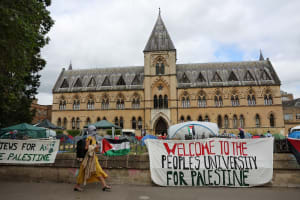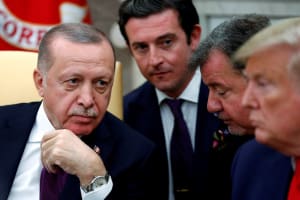UAE voices concern over role of Qatar & Turkey in Gaza, lack of 'clear framework' for int'l security force
Israel continues to destroy terror infrastructure, confront violations of ceasefire inside Yellow Line

The United Arab Emirates views the significant role of Turkey and Qatar in the post-war Gaza reconstruction with concern, according to a recent report in The Jerusalem Post.
The Post cited an anonymous source familiar with the UAE government’s stance on the Gaza peace plan, who said that the UAE sees Qatar and Turkey as “Hamas enablers.”
“These states will make it possible for the terrorist organization to continue existing,” the source told the Post. However, the source went further, stating that Qatar, whose government is affiliated with Muslim Brotherhood ideology and groups, has enabled Brotherhood-linked actors to assume “key positions” in the post-war Gaza reconstruction.
“There are interested parties affiliated with the Muslim Brotherhood who are currently embedding themselves in key positions in the Gaza reconstruction plan,” the source claimed.
The UAE’s concern was further highlighted by a recent statement from the Qatari Foreign Ministry, which announced that Mohammed bin Abdulrahman bin Jassim bin Jaber Al-Thani, who holds the office of prime minister and foreign minister concurrently, had shared updates with Iran regarding the situation in Gaza.
The Qatari Foreign Ministry announced that al-Thani updated his Iranian counterpart in the foreign ministry on the latest developments in the Gaza Strip. The statement said that al-Thani stressed the need to integrate Tehran into future "regional efforts.”
According to the official statement, Al-Thani spoke by phone with the Iranian foreign minister and discussed with him the situation in Gaza and the "Palestinian territories" in light of the ceasefire agreement. Qatar, which played a central role in mediating between Israel and Hamas, also maintains friendly relations with Iran.
This announcement highlights the concerns expressed by Israeli officials and the UAE regarding Qatar’s role in post-war Gaza.
These concerns are behind the recent statement by Dr. Anwar Gargash, diplomatic adviser to the UAE President Mohammed bin Zayed al-Nahyan, at the Abu Dhabi Strategic Debate forum.
Dr. Gargash told the forum, “The UAE does not yet see a clear framework for the stability force, and under such circumstances, it will probably not participate in such a force.”
The lack of “clear framework” likely refers to both Israeli and Egyptian opposition to Turkish participation in the International Stabilization Force (ISF) in Gaza, which is supposed to take over security duties in the enclave once Hamas disarms, according to the U.S.-backed peace plan.
While the UAE has doubts about the composition of the ISF, the country reiterated its overall support for the Gaza peace deal.
Dr. Gargash reaffirmed that the UAE “will support all political efforts aimed at peace and will remain at the forefront of countries providing humanitarian aid.”
Previously, Dr. Gargash noted the role of the UAE’s diplomatic relations with Israel in enabling the country to play a key role in humanitarian aid to Gaza during and after the war, including the evacuation of Gazans for medical treatment.
“The aid we provided is not only because the UAE is generous; it’s also because the UAE has been able to leverage its relations with Israel to use that access,” Gargash said at the Reuters NEXT Gulf Summit in October. “If we had no relationship with Israel, we wouldn’t have been able to bring 3,000 Palestinians and their families here.”
Both the UAE and Saudi Arabia have expressed reservations regarding the development of the Gaza ceasefire and plans for the reconstruction of Gaza.
Recent reports claim that Saudi Arabia has linked its participation in and funding of the Gaza reconstruction effort to the disarmament of the Hamas terror organization.
The two nations are particularly concerned about the role of Turkey and Qatar over their links to the Muslim Brotherhood, their continued support for Hamas, as well as their links to terror organizations.
Israel has also expressed its concerns about Turkey’s role in post-war Gaza and said that it will not allow Turkish forces to participate in the ISF.
The Turkish Defense Ministry said on Thursday that the ISF must ensure the delivery of humanitarian supplies into Gaza and ensure the ceasefire doesn’t collapse.
Meanwhile, the situation in Gaza appears to be at a standstill, with no clear resolution for the situation of the trapped Hamas terrorists inside the Yellow Line in the Rafah area, along with continued violations of the ceasefire by armed terrorists in the Gaza Strip.
The IDF has been destroying tunnel infrastructure on the Israeli side of the Yellow Line in Rafah. In a recent operation to do so, four armed terrorists approached the Israeli soldiers inside the line, who eliminated them (the terrorists) upon identification.
Shortly after that, in Khan Younis, another terrorist was spotted approaching an IDF position. The soldiers fired and killed the suspect.
According to reports in Hebrew media, White House Middle East adviser Jared Kushner spoke with the IDF about contingency plans for Gaza in the event that Hamas' intransigence prevents moving to the second phase of the deal.

The All Israel News Staff is a team of journalists in Israel.
You might also like to read this:

















